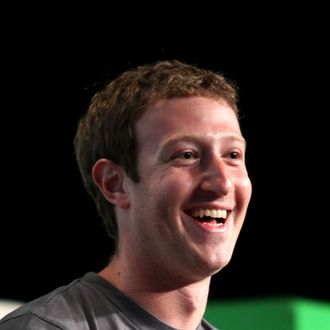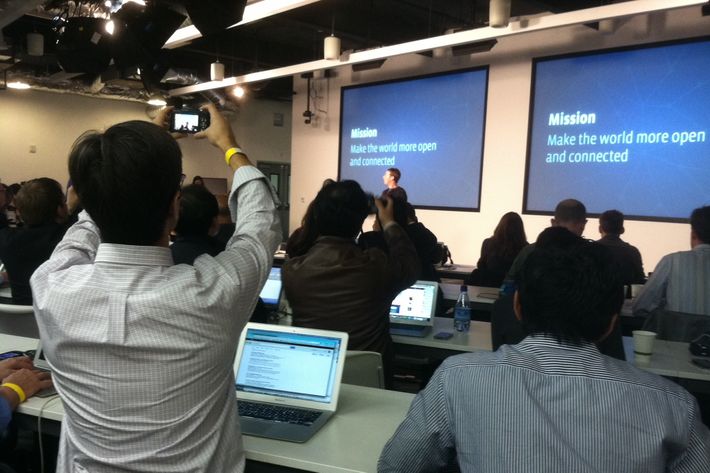
I’m sitting in the Facebook headquarters, in Menlo Park, in a room filled with the symphonic clicking of keys produced by hundreds of tech bloggers, all writing the same stories and updating the same live-blogs on identical Apple laptops. Upbeat house-lite music is playing — the kind of thing you’d hear at a mid-level hair salon — and the walls of the room are decorated with Facebookisms: “MOVE FAST AND BREAK THINGS,” “FORTUNE FAVORS THE BOLD.”
In front of the stage is a teleprompter with a countdown clock, which Mark Zuckerberg just used in a short, swift sales pitch for his latest offering, “Social Graph,” the network’s new foray into search.
Zuckerberg has long departed — he was disappeared from a teeming pile of reporters and cameras and out a back door like a sitting president — so now it’s just us and the PR Borg. Oh, the PR Borg. Facebook’s communications staffers are paired up with reporters at demo stations, showing off Graph on a series of computers. The spares are milling around the room. There must be 50 of them — a phalanx of fresh-faced professionals with smiles on their faces and carefully scripted responses to our questions in their hip pockets. Afterwards, we’ll join them for sushi.

Back when it was a private company, none of this happened. Facebook didn’t “launch” products and features with long, scripted events attended by a media scrum. It simply took them live. I still remember the day that Facebook’s new chat box appeared on my page. It made no explanation for itself (or may have, but I missed it). There was an element of discovery, of trial and error to it.
Now that Facebook is a huge, public corporation, it makes changes like Steve Jobs’s Apple did. It no longer releases a series of small, nearly invisible tweaks that slide into consciousness and habit among users who may not even notice anything is different. It has replaced those with large product launches, each of which is a guided tour meant to force consumers to pay attention to what’s new and exciting about its product line, if only for a minute or two. It wants no secrets about how you can use Graph Search to look for “Photos of friends before 1990” or “Chinese restaurants in Boston that my friends from college like.” To leave experimentation up to the user would be to invite misinterpretation, and the Borg would prefer not to abide that.
When you’re Facebook’s size, launches are a high risk/high reward strategy. If the media extravaganza works, as it did today, you get a nearly bottomless series of fawning articles and hands-on videos. If your product fails to wow (as at Apple’s last iPhone launch), you get an entire news cycle filled with eye-rolling and a drop in your stock price.
Facebook has clearly calculated that with a billion users, it needs to act its size and make its feature launches into cannonball splashes. Unlike Apple, its features aren’t “products,” strictly speaking — there is no gadget to run out and preorder as soon as the announcement is made. But the effect is the same. When Mark Zuckerberg tells you how to search for single women in your neighborhood who are into Homeland and like bourbon, the instinct is to pull up the nearest laptop and get down to creeping.
I never went to an Apple event in the Steve Jobs era, but I gather that the pitch is nearly identical: the charismatic founder, the well-paced presentation, the subtle way that certain media outlets are subtly given preference. (This time, major news outlets — this one not included — were given off-the-record briefings about Social Graph.) It’s all drawn from a playbook that was developed a decade ago and has been used to transform a smallish computer company into the largest corporation in the world.
The Facebook PR Borg’s decision to act like Apple means that it has similar aspirations and could fall into similar traps. It means that Mark Zuckerberg needs to keep the hits coming, or else risk having Facebook’s announcements turn into missable non-events. And it means that, like them or hate them, the breathless live-blogs are probably here to stay.





























